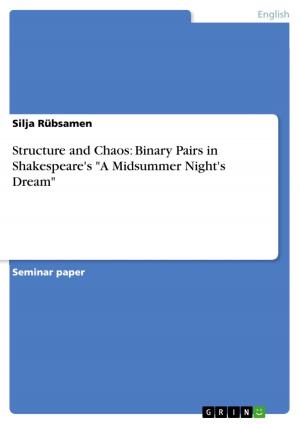Wild(e) Times - Sexual Deviance in Henry James's 'The Turn of the Screw'
Fiction & Literature, Literary Theory & Criticism, British| Author: | Anonymous | ISBN: | 9783640771981 |
| Publisher: | GRIN Publishing | Publication: | December 8, 2010 |
| Imprint: | GRIN Publishing | Language: | English |
| Author: | Anonymous |
| ISBN: | 9783640771981 |
| Publisher: | GRIN Publishing |
| Publication: | December 8, 2010 |
| Imprint: | GRIN Publishing |
| Language: | English |
Examination Thesis from the year 2008 in the subject English - History of Literature, Eras, grade: 1,0, Johannes Gutenberg University Mainz, language: English, abstract: ... The only reason for the existence of a novel is that it does attempt to represent life. Henry James. Originally published in 1898, Henry James's novella The Turn of the Screw mingles a (possible) ghost story with topics of actual nineteenth-century social hysteria. Thereby, akin to the turns of an actual screw, consecutively in its design, the novella's very content implies 'serial turnings, like serial killings.'1 With its narrative structure, the text has provoked an enormous amount of contradictory literary criticism, dividing its interpreters into various camps: 'If the ghosts of The Turn of the Screw are not real, certainly the controversy over them is.' In fact, the history of the narrative's literary criticism has brought to the forefront apparitionists and non-apparitionists;however, even though pundits have ambitiously tried to unite these approaches, a final fusion was foredoomed. This incompatible effect, I argue, is caused by the text's linguistic ambiguity, James's distinctive erotic style, but also by a masterful artifice: While interpreting the novella, the reader is forced to participate in the story and thus, simultaneously, in the scandal of the story itself. As Felman puts it, the reader cannot stay innocent. Taking this for granted, then, my approach is not to find the ultimate solution why one reading should be treated superior to another. Instead, I will maintain this duality and concentrate on the overall function of the text. By placing the narrative within its historical context, mainly with a focal point on the aspects of sexuality in nineteenth-century Anglo- American culture, specifically the Oscar Wilde trials...
Examination Thesis from the year 2008 in the subject English - History of Literature, Eras, grade: 1,0, Johannes Gutenberg University Mainz, language: English, abstract: ... The only reason for the existence of a novel is that it does attempt to represent life. Henry James. Originally published in 1898, Henry James's novella The Turn of the Screw mingles a (possible) ghost story with topics of actual nineteenth-century social hysteria. Thereby, akin to the turns of an actual screw, consecutively in its design, the novella's very content implies 'serial turnings, like serial killings.'1 With its narrative structure, the text has provoked an enormous amount of contradictory literary criticism, dividing its interpreters into various camps: 'If the ghosts of The Turn of the Screw are not real, certainly the controversy over them is.' In fact, the history of the narrative's literary criticism has brought to the forefront apparitionists and non-apparitionists;however, even though pundits have ambitiously tried to unite these approaches, a final fusion was foredoomed. This incompatible effect, I argue, is caused by the text's linguistic ambiguity, James's distinctive erotic style, but also by a masterful artifice: While interpreting the novella, the reader is forced to participate in the story and thus, simultaneously, in the scandal of the story itself. As Felman puts it, the reader cannot stay innocent. Taking this for granted, then, my approach is not to find the ultimate solution why one reading should be treated superior to another. Instead, I will maintain this duality and concentrate on the overall function of the text. By placing the narrative within its historical context, mainly with a focal point on the aspects of sexuality in nineteenth-century Anglo- American culture, specifically the Oscar Wilde trials...















